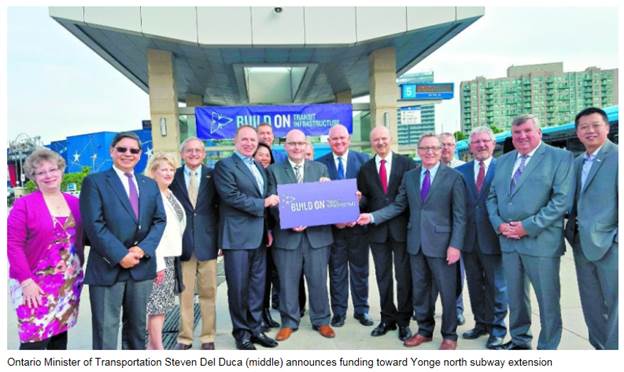
Eye on York Region: Yonge subway extension to the 905 is one of many big changes coming to the area
PostCity.com
July 20, 2016
David Fleischer
Change often comes incrementally and when you least expect it, but a few of the big issues I have discussed in this space over the past year have seen significant and even surprising progress in recent months.
The most obvious is the announcement of $55 million to advance engineering work on the Yonge subway extension up to Highway 7.
Although it has remained a priority for our municipalities, it’s a project that has been virtually dormant since 2009. It’s sobering to remember the days when projections were that the subway could open by 2017 or 2018. Things changed.
Toronto’s priority was that the Downtown Relief Line be built first to alleviate the capacity crunch at Yonge-Bloor station, so it was no coincidence that officials converged on Richmond Hill Centre for their announcement just days after Toronto unveiled its proposed route for the DRL.
The hurdle for both subways is capital funding. But the province will have some money thanks to its controversial Hydro sale and the Trudeau government promising major infrastructure investment. That’s what this is really about: getting all the ducks in a row, so when the taps start flowing, our priority projects are ready to go.
I also wrote about the review the province was undertaking of the Greenbelt Act, Places to Grow and other anti-sprawl legislation. York Region, Vaughan and Markham had undertaken the act of not outright asking to remove land from the Greenbelt but at least some sort of mechanism for municipalities to evaluate “boundary shifts.” The province’s proposed policies were announced last month, and they went the other way.
Municipalities are obligated to direct at least 40 per cent of new growth to within their built boundaries — a target Vaughan, Markham and Richmond Hill have exceeded, but few others — but that rises to 60 per cent after 2031. The minimum density target is also going up substantially. Lands are being added to the Greenbelt. And as for municipalities who want to give the Greenbelt a little pruning? Nothing to be seen among the 87 recommendations.
Tying back to the subway, it was also good to see them explicitly linking the need for new infrastructure to denser development.
The main detractors are the building industry, who warn we need more land to provide single-family homes for our growing population, but I’m skeptical.
Firstly, we’ve built so many single-family homes, what our suburbs need is a more balanced housing mix to serve a diverse population. Secondly, they claim restricting land supply through the Greenbelt is a big factor in our increased real estate prices, but there’s actually little evidence of any direct connection. Finally, developers tend to do what they know works, and that’s what’s worked since the end of the Second World War. But we can see shifting demographics — smaller families, an aging population, etc. We need to build for that, not post-war nuclear families.
Which dovetails nicely into the issue of developers contributing to municipal election campaigns. It has long been argued, particularly by York University professor Robert MacDermid, that allowing non-voting entities like unions and corporations to contribute to local campaigns distorts the democratic process. It’s particularly concerning in the 905, where there is a vested interest in perpetuating sprawl.
Such a ban already exists at the federal level, but there was little reason for the province to introduce something similar for municipalities and leave themselves as the only ones still raking in the big bucks. But that logic got turned on its head when the Toronto Star ran stories about how the Liberals and previous provincial governments held lucrative, private fundraisers for corporate bigwigs.
The premier introduced reforms at the provincial level and announced the province would let municipalities make their own decisions on the matter. Ajax has taken the lead, discouraging such donations, and across the region there are individual grassroots candidates who forswore any donations not from individuals.
But once the bill passes, it will be up to you to remind your local council for whom it works and demand change. In concert, in just the past few months, we’ve been given some of the most crucial ingredients for creating a healthier, more sustainable and democratic York Region.

